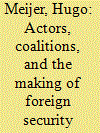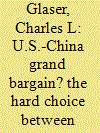| Srl | Item |
| 1 |
ID:
140729


|
|
|
|
|
| Summary/Abstract |
In light of the intertwining logics of military competition and economic interdependence at play in Sino–American relations, this paper examines how the United States has balanced conflicting national security and economic interests in the making of US export control policy on defense-related technology toward China. Relying upon a large body of primary sources (including 170 interviews), it seeks to contribute to the understanding of this strategically sensitive yet neglected area of Sino–American relations. It is shown that, as a consequence of the erosion of the US capacity to control the diffusion of defense-related technology to China in the post-Cold War era, a growing set of actors within the United States has reassessed the security/economic calculus in Washington's relationship with Beijing. Specifically, this coalition advocates the streamlining of export controls to sustain the defense and technological industrial base and thereby maintain American military/technological preeminence vis-à-vis a rising China.
|
|
|
|
|
|
|
|
|
|
|
|
|
|
|
|
| 2 |
ID:
115223


|
|
|
|
|
| Publication |
2012.
|
| Summary/Abstract |
This essay aims to make a contribution to the conversation between IR and nationalism literatures by considering a particular question: What is the relationship between interstate military competition and the emergence of nationalism as a potent force in world politics? The conventional wisdom among international security scholars, especially neorealists, holds that nationalism can be more or less treated like a "technology" that allowed states to extract significant resources as well as manpower from their respective populations. This paper underlines some of the problems involved with this perspective and pushes forward an interpretation that is based on the logic of political survival. I argue that nationalism's emergence as a powerful force in world politics followed from the "mutation" and absorption of the universalistic/cosmopolitan republican ideas that gained temporary primacy in Europe during the eighteenth century into particularistic nationalist ideologies. This transformation, in turn, can be best explained by the French Revolution's dramatic impacts on rulers' political survival calculi vis-à-vis both interstate and domestic political challenges. The analysis offered in this essay contributes to our understanding of the relationship between IR and nationalism while also highlighting the potential value of the political survival framework for exploring macrohistorical puzzles.
|
|
|
|
|
|
|
|
|
|
|
|
|
|
|
|
| 3 |
ID:
133390


|
|
|
|
|
| Publication |
2013.
|
| Summary/Abstract |
The Arctic, during the Cold War a locus of intense military competition between the United States and the Union of Soviet Socialist Republics, is rapidly reemerging as a geostrategic flash point. As accelerating climate change melts the Arctic's perennial sea ice, littoral as well as peripheral actors are preparing to exploit emergent economic and strategic opportunities in the High North. Although the possibility of armed conflict over Arctic resources has been somewhat discounted, a fair amount of saber rattling in recent years among the "Arctic Eight"-the United States, Russia, Canada, Denmark, Finland, Iceland, Norway, and Sweden-has given rise to the notion that circumpolar security actors may be priming for a "new kind of Cold War" in the North.
|
|
|
|
|
|
|
|
|
|
|
|
|
|
|
|
| 4 |
ID:
138169


|
|
|
|
|
| Summary/Abstract |
China’s growing military power has fueled a security competition with the United States, increasing the risk of war between the two countries. To reduce this likelihood, the United States and China should negotiate a grand bargain in which the United States ends its commitment to defend Taiwan, and China agrees to resolve its maritime territorial disputes peacefully and accepts the United States’ long-term military presence in East Asia.
|
|
|
|
|
|
|
|
|
|
|
|
|
|
|
|